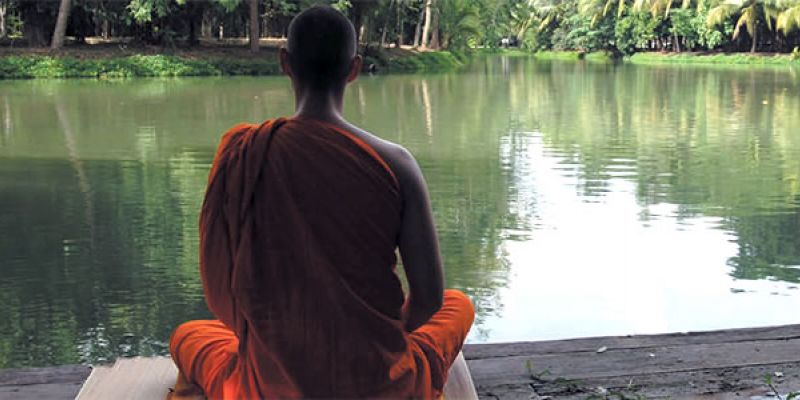
A Funeral in a Buddhist Temple
I first met Mr. Ikehata when Rev. Tesshu, a Buddhist priest, took Columban Fr. Bede Cleary and me to meet him on a hot summer day. The four of us were sitting round a low table in the tatami room and in no time at all the conversation was about the Holy Spirit. I remember marveling at the wonder of it: a Shinto druid, a Buddhist priest and two Catholic priests sitting around talking animatedly about the Holy Spirit.
At that time I was living in a small house in the mountains, and because it hadn’t rained for many weeks, I had no water. I used to go down to the river at the foot of the mountain to bathe. I quite enjoyed that, but by the time I got back up to the house, I would be lathered in sweat again. One day I got word that Mr. Ikehata had heard of my plight from Rev. Tesshu. He had built a place for spiritual renewal and was offering it to me.
It consisted of three huts, an ordinary dwelling house, a large tatami room for meetings, and another two-story prefab building, in a spawater area. He was making all of this available to me, because he considered inter-faith dialogue important. This would be the place to which I could invite people for meditation and retreat. For me the communication or dialogue that takes place through silence is most real.
Mr. Ikehata’s health was not good. Indeed that is why he had had to abandon his dream of setting up and running this renewal center. I used to visit him from time to time and our conversations were always of great interest to me. His illness grew worse so that he had to be confined to the hospital. There, he once confided that he loved my visits, because I was the only person with whom he could talk about God.
His illness grew worse so that he had to be conned to the hospital. ere, he once conded that he loved my visits, because I was the only person with whom he could talk about God.
As his condition deteriorated his wife asked if I could get him into a hospice for the dying. There are few hospices in Japan because they are too explicit a recognition of death; the state-run hospices are euphemistically called Relax Care Centers. We succeeded in gaining Mr. Ikehata a place in one such center. After a tedious seven-hour drive and with the help of a supply of oxygen, we finally got there. It was good to see the happiness on Mr. Ikehata’s face once he was installed in his room.
On the wall directly opposite his bed there was a crucifix, and I often saw him make the sign of the cross when the going was rough. My own commitments did not permit me to visit him very often until I had a message from him that he thought his remaining time was short. I spent the last four days of his life with him. How often he thanked me for getting him into the hospice. We laughed a lot too. We talked about heaven, and I read from the Christian Bible for him, especially the passage from St. John where Jesus says: “Do not be afraid. Believe in God and believe in me. In my Father’s house there are many mansions.”
The pain-control medication was increased, and we all knew he might go into a deep sleep and never regain consciousness. But some hours later he would wake up and be surprised that we were still around; I think he was expecting to wake up in a different place. This happened three times and on the third time he said to me with a note of complaint in his voice, “I went up there three times and three times they turned me back.”
He died peacefully shortly after midnight on Easter Thursday. I had settled myself on a chair and was reading one of the Gospels. I called his wife when I noticed a change in his breathing and shortly afterwards he slipped away quietly. I was intrigued to notice that the first thing his wife did was to open the window slightly so that his spirit would not be trapped in the room. This is one of my friend’s beliefs that would not make a lot of sense to me, but these things don’t matter. He would be the first to say that it wasn’t what the human being could verbalize that was important for unity, but rather the awareness of that which could not be expressed.
His funeral was held in a Buddhist temple and presided over by a Buddhist priest. I consider it a rare honor that I was asked by the family to speak the eulogy. Imagine a Catholic priest speaking the eulogy at the funeral of a Shinto priest in a Buddhist temple! I don’t know what the congregation were thinking, but when I was giving Mr. Ikehata his last cigarette, or later supplying oxygen and helping take the phlegm from his throat, I couldn’t help thinking that this surely is a dialogue where God is also involved!
Columban Fr. Seamus Cullen was ordained in 1966 and has lived in Japan since 1967, apart from a short period when he was assigned to New Zealand. Over the years he has worked in a number of Catholic parishes, but his passion is interfaith dialogue.


 The Columbans are a society of missionaries, including priests and lay people, who minister to people of various cultures as a way of witnessing to the universal love of God.
The Columbans are a society of missionaries, including priests and lay people, who minister to people of various cultures as a way of witnessing to the universal love of God.